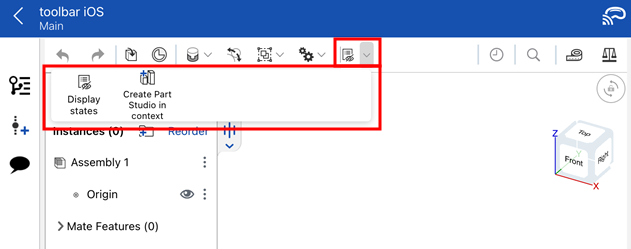 建立關聯中的 Part Studio
建立關聯中的 Part Studio
![]()
![]()
![]()
在現有的組合件關聯中建立新的 Part Studio;明確地定位組合件以供建構零件時使用。組合件在 Part Studio 中會以關聯圖形出現,以供參考之用。
在環繞零件的關聯中建構零件是一種功能強大的由上而下設計方式。Onshape 提供數種由上而下設計零件的方式。每個方式各有其優點,所以您可能會要在不同的設計情境中使用不同的方法:
- 如果您有一個組合件並希望在關聯中於新的 Part Studio 內建立新的零件,請使用「建立關聯中的 Part Studio」工具 (將在這個主題中說明)。
- 當您有一或多個預先存在的零件與 Part Studios,請使用在關聯中建構模型。當互有關係的零件是在個別的 Part Studios 內建立,或零件需要存在於不同 (連結的) 文件中的情況下使用。
當幾何條件關係是取決於組合件位置時,這也是一個好的選項。此種案例通常發生在組合件已經存在,而您需要對其中的零件做出關聯中編輯的情況下。對於僅使用一個參數歷程來驅動所有零件是不可行的大型組合件,此種方法也相當適合。
- 當您在設計過程的開端即完全掌握設計意圖,並要使用單一參數歷程來驅動數個相關零件的情況下,可使用 Onshape 多零件 Part Studios 的設計方式。
若要進一步了解在關聯中的設計,您可用自己的步調跟著 Managed In-Context Design (需要有 Onshape 帳戶) 的課程操作。
- 按一下
 。
。 - 選擇一個結合連接器 (隱含或明確的) 或組合件原點來做為新 Part Studio 草圖平面的原點。
- 按一下
 。
。 - 系統會建立並開啟一個新的 Part Studio。
注意到參考平面出現,且與原點或您選擇的結合連接器 (隱含或明確的) 對齊。圖形區域上方顯示一個訊息並有下拉清單 ([插入並前進至組合件中]/[前進至組合件])。
- 建立草圖或是選擇另一個模型建構工具來開始在組合件的關聯中建構模型。注意到組合件在視覺上是較為暗淡的。
- 選擇一個關聯中的參考圖元來做為您要執行動作的基礎,注意到會以紫色/粉紅色來強調顯示圖元。
於組合件關聯中建立的關聯物件會列在 Part Studio 特徵清單的最上方。
在特徵清單中的新特徵有一個關聯箭頭
 ,表示是使用組合件關聯中的參考來建立特徵的。
,表示是使用組合件關聯中的參考來建立特徵的。 - 建立零件之後,可以選擇:
- 插入並前進至組合件中 - 將零件插入回組合件中並開啟組合件:
- 選擇一個零件 (若建立多個零件可選擇多個零件) 來插回組合件中。
- 按一下
 。
。 - 請注意,組合件實例清單中的零件有一個關聯箭頭
 ,表示其是在組合件的特定關聯中所建立的,並且是關聯中零件的主要實例。
,表示其是在組合件的特定關聯中所建立的,並且是關聯中零件的主要實例。
- 前進至組合件 - 開啟組合件但不插入新的零件。
如果您之後在組合件中使用「插入」零件工具來插入零件,零件的關聯並不會與定位組合件的零件主要實例相關聯,會以一個虛線箭頭
 來表示,而不是表示主要實例的實線箭頭。
來表示,而不是表示主要實例的實線箭頭。
- 插入並前進至組合件中 - 將零件插入回組合件中並開啟組合件:
Part Studio 關聯要求至少要將關聯所參考的一個 Part Studio 的零件插入到組合件中,且必須將這個零件設定為關聯的主要實例。
要進一步了解在關聯中的模型建構,包括在關聯中的編輯、更新關聯與結束關聯,請參考在關聯中建構模型。
步驟
- 在組合件中為組合件原點 (在組合件清單中) 開啟環境選單 (三垂直點) 。
- 輕觸「建立關聯中的 Part Studio」圖示 (
 )。
)。

- 選擇組合件原點來做為新 Part Studio 的原點:可以是組合件原點或組合件中的結合連接器。
- 輕觸核取記號。
- 新的 Part Studio 開啟。
圖形區域上方出現一個訊息,並有下拉功能表 (包含 [前進至組合件] / [插入並前進至組合件中] 的指令)。
- 建立草圖或是選擇另一個模型建構工具來開始在組合件的關聯中建構模型。注意到組合件在視覺上是較為暗淡的。
- 選擇一個關聯中的參考圖元來做為您要執行動作的基礎,注意到圖元被強調顯示。您可以使用所參考組合件的幾何來建立新的幾何 (藉由 [使用] 工具)。
於組合件關聯中建立的關聯物件會列在 Part Studio 特徵清單的最上方。
在「特徵」清單中的新特徵有一個關聯箭頭圖示,表示是使用組合件關聯中的參考來建立特徵的。
- 建立零件之後,可以選擇:
- 插入並前進至組合件中 - 將零件插入回組合件中並開啟組合件:
- 選擇一個零件 (若建立多個零件可選擇多個零件) 來插回組合件中。
- 輕觸核取記號。
- 請注意,組合件實例清單中的零件有一個關聯箭頭圖示,表示其是在組合件的特定關聯中所建立的,並且是關聯中零件的主要實例。
- 前進至組合件 - 開啟組合件但不插入新的零件。
如果您之後在組合件中使用「插入」零件工具來插入零件,零件的關聯並不會與定位組合件的零件主要實例相關聯,會以一個虛線箭頭圖示來表示,而不是表示主要實例的實線箭頭。
- 插入並前進至組合件中 - 將零件插入回組合件中並開啟組合件:
要進一步了解在關聯中的模型建構,包括在關聯中的編輯、更新關聯與結束關聯,請參考在關聯中建構模型。
在現有的組合件關聯中建立新的 Part Studio;明確地定位組合件以供建構零件時使用。組合件在 Part Studio 中會以關聯圖形出現,以供參考之用。
步驟
- 在組合件中為組合件原點 (在組合件清單中) 開啟環境選單 (三垂直點) 。
- 輕觸
 。
。 - 選擇組合件原點來做為新 Part Studio 的原點:可以是組合件原點或組合件中的結合連接器。
- 輕觸核取記號。
- 新的 Part Studio 開啟。
圖形區域上方出現一個訊息,並有下拉功能表 (包含 [前進至組合件] / [插入並前進至組合件中] 的指令)。
- 建立草圖或是選擇另一個模型建構工具來開始在組合件的關聯中建構模型。注意到組合件在視覺上是較為暗淡的。
- 選擇一個關聯中的參考圖元來做為您要執行動作的基礎,注意到圖元被強調顯示。您可以使用所參考組合件的幾何來建立新的幾何 (藉由 [使用] 工具)。
於組合件關聯中建立的關聯物件會列在 Part Studio 特徵清單的最上方。
在「特徵」清單中的新特徵有一個關聯箭頭圖示,表示是使用組合件關聯中的參考來建立特徵的。
- 建立零件之後,可以選擇:
- 插入並前進至組合件中 - 將零件插入回組合件中並開啟組合件:
- 選擇一個零件 (若建立多個零件可選擇多個零件) 來插回組合件中。
- 輕觸核取記號。
- 請注意,組合件實例清單中的零件有一個關聯箭頭圖示,表示其是在組合件的特定關聯中所建立的,並且是關聯中零件的主要實例。
- 前進至組合件 - 開啟組合件但不插入新的零件。
如果您之後在組合件中使用「插入」零件工具來插入零件,零件的關聯並不會與定位組合件的零件主要實例相關聯,會以一個虛線箭頭圖示來表示,而不是表示主要實例的實線箭頭。
- 插入並前進至組合件中 - 將零件插入回組合件中並開啟組合件:
要進一步了解在關聯中的模型建構,包括在關聯中的編輯、更新關聯與結束關聯,請參考在關聯中建構模型。